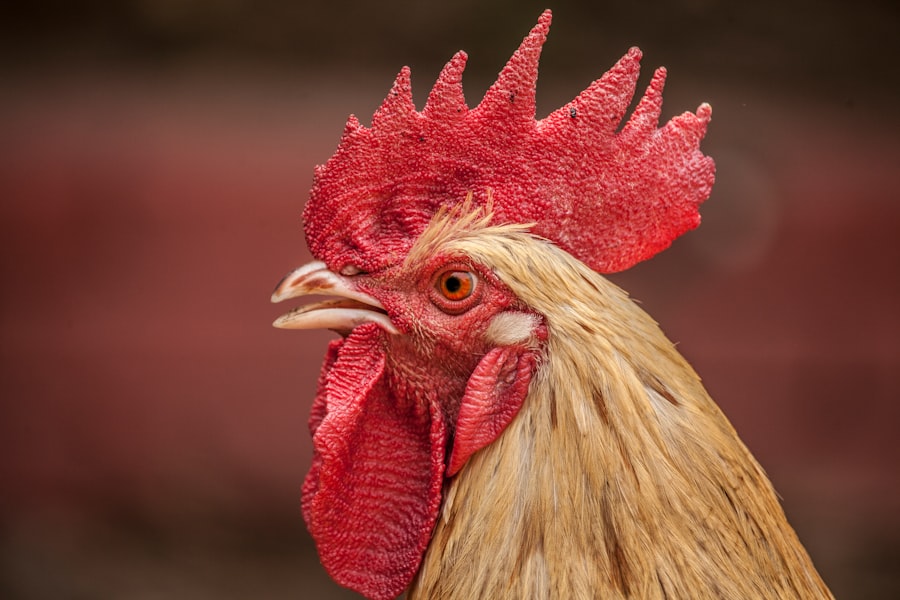Keeping chickens warm during the winter months is crucial for their health and well-being. Chickens are sensitive to cold temperatures and can suffer from a variety of negative effects if not properly protected. Cold weather can lead to frostbite, respiratory issues, decreased egg production, and even death. As responsible chicken owners, it is our duty to provide a warm and comfortable environment for our feathered friends.
Key Takeaways
- Keeping chickens warm is important for their health and well-being during winter.
- Understanding your chickens’ needs, such as their breed and age, is crucial for choosing the right type of coop and providing proper care.
- Choosing a well-insulated coop and providing proper ventilation can help regulate temperature and prevent moisture buildup.
- Supplemental heating options should be used with caution and only as a last resort, as they can be a fire hazard and cause respiratory issues for chickens.
- Providing ample bedding and ensuring access to food and water can also help keep chickens warm and healthy during winter.
Understanding the needs of your chickens
During the winter, chickens naturally adjust their behavior to stay warm. They will fluff up their feathers to create an insulating layer of air, huddle together for warmth, and may even roost closer to the ground to avoid drafts. Chickens also have the ability to regulate their body temperature by adjusting their metabolic rate. However, extreme cold temperatures can overwhelm their natural defenses, making it essential for us to provide additional warmth.
Choosing the right type of chicken coop for winter
When it comes to choosing a chicken coop for winter, there are several options available. Traditional wooden coops provide good insulation but may require additional measures to keep out drafts. Plastic or metal coops are more resistant to drafts but may require insulation to retain heat. It is important to choose a coop that is well-ventilated yet provides adequate protection from the elements.
Insulating your chicken coop
Insulating your chicken coop is crucial for maintaining a warm and comfortable environment for your chickens. Insulation helps retain heat and prevent drafts from entering the coop. There are several types of insulation available, including foam boards, fiberglass insulation, and reflective insulation. It is important to insulate the walls, ceiling, and floor of the coop to ensure maximum effectiveness.
Providing proper ventilation
While insulation is important for keeping chickens warm, proper ventilation is equally crucial. Good ventilation helps remove moisture and ammonia from the coop, preventing respiratory issues and frostbite. It is important to provide ventilation without compromising warmth. This can be achieved by installing vents near the roofline or using adjustable vents that can be opened or closed as needed.
Supplemental heating options

In extreme cold temperatures, supplemental heating may be necessary to keep chickens warm. There are several options available, including heat lamps, radiant heaters, and heated pads. Heat lamps are a popular choice but can be a fire hazard if not used properly. Radiant heaters provide a more even heat distribution, while heated pads offer a cozy spot for chickens to rest. It is important to carefully monitor the temperature and ensure that the heating option is safe for your chickens.
Using bedding to keep chickens warm
Using bedding in the chicken coop is essential for keeping chickens warm during winter. Bedding provides insulation and helps retain heat. There are several types of bedding available, including straw, wood shavings, and shredded paper. It is important to regularly clean and replace the bedding to maintain a clean and healthy environment for your chickens.
Feeding your chickens for warmth
Proper nutrition is crucial for keeping chickens warm during winter months. Feeding your chickens a balanced diet that includes high-quality protein and fats will help them generate body heat. You can also provide warm treats such as cooked grains or vegetables to help keep them warm from the inside out. It is important to ensure that your chickens have access to fresh water and food at all times.
Watering your chickens in winter
Providing water to chickens during winter can be challenging due to freezing temperatures. It is important to prevent water from freezing by using heated waterers or insulating existing waterers with foam or insulation tape. You can also provide warm water to your chickens by adding hot water to their waterers throughout the day.
Monitoring your chickens’ health during winter
Monitoring your chickens’ health during winter is crucial for identifying and treating any potential issues. Common winter illnesses in chickens include respiratory infections, frostbite, and vitamin deficiencies. It is important to regularly check your chickens for signs of illness, such as coughing, sneezing, lethargy, or discoloration of the comb and wattles. Providing a clean and dry environment, ensuring proper nutrition, and offering supplemental heat if necessary can help keep your chickens healthy during winter.
Keeping chickens warm during the winter months is essential for their health and well-being. By understanding their natural behaviors, choosing the right type of coop, insulating the coop, providing proper ventilation, using bedding, feeding them appropriately, watering them effectively, and monitoring their health, we can ensure that our feathered friends stay warm and comfortable throughout the winter. It is our responsibility as chicken owners to take the necessary steps to protect our chickens from the negative effects of cold weather. By doing so, we can ensure that they thrive and continue to provide us with fresh eggs and companionship.
If you’re looking for the best way to keep your chickens warm during the colder months, you’ll definitely want to check out this informative article on Poultry Wizard. They provide valuable insights and tips on using a heater for a chicken coop, which can be a game-changer in maintaining optimal temperatures for your feathered friends. With their expertise, you can ensure that your chickens stay cozy and comfortable all winter long. For more helpful articles on chicken coop maintenance, be sure to explore their resources on topics such as chicken coop Muskegon and the importance of a well-designed floor for your chicken coop.
FAQs
What is the best way to keep chickens warm?
The best way to keep chickens warm is to provide them with a well-insulated coop that is free from drafts. You can also use heat lamps or heated pads to provide additional warmth.
What temperature should a chicken coop be?
A chicken coop should be kept at a temperature between 50 and 80 degrees Fahrenheit. It is important to monitor the temperature regularly to ensure that it stays within this range.
What are some signs that chickens are too cold?
Some signs that chickens are too cold include huddling together, fluffing up their feathers, and shivering. If you notice these signs, it is important to provide them with additional warmth.
Can chickens get frostbite?
Yes, chickens can get frostbite if they are exposed to cold temperatures for extended periods of time. It is important to keep their coop well-insulated and provide them with additional warmth during cold weather.
What bedding is best for keeping chickens warm?
Straw or wood shavings are the best bedding options for keeping chickens warm. They provide insulation and help to trap heat in the coop. It is important to keep the bedding clean and dry to prevent moisture buildup.
Meet Walter, the feathered-friend fanatic of Florida! Nestled in the sunshine state, Walter struts through life with his feathered companions, clucking his way to happiness. With a coop that’s fancier than a five-star hotel, he’s the Don Juan of the chicken world. When he’s not teaching his hens to do the cha-cha, you’ll find him in a heated debate with his prized rooster, Sir Clucks-a-Lot. Walter’s poultry passion is no yolk; he’s the sunny-side-up guy you never knew you needed in your flock of friends!







